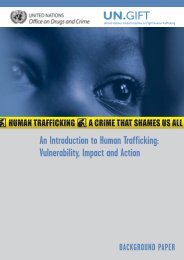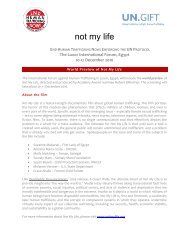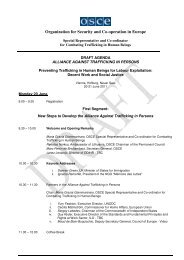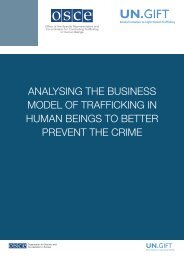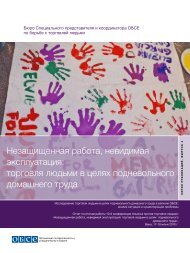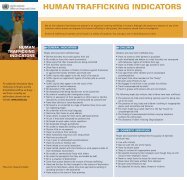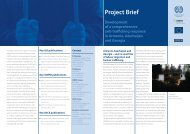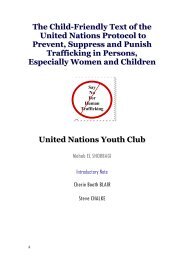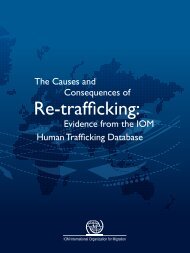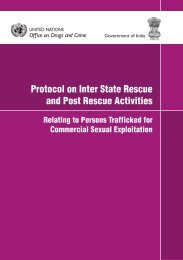Zastita zrtava i prevencija trgovine ljudima - UN.GIFT.HUB - UN ...
Zastita zrtava i prevencija trgovine ljudima - UN.GIFT.HUB - UN ...
Zastita zrtava i prevencija trgovine ljudima - UN.GIFT.HUB - UN ...
You also want an ePaper? Increase the reach of your titles
YUMPU automatically turns print PDFs into web optimized ePapers that Google loves.
Zajednički program <strong>UN</strong>HCR, <strong>UN</strong>ODC i IOM za borbu protiv <strong>trgovine</strong> <strong>ljudima</strong> u Srbiji<br />
the course of work on the Study: vulnerability of children accommodated in<br />
social protection institutions or in foster families who are, according to the<br />
percentages, frequent victims of human trafficking in the total number of child<br />
victims. In addition, the attitude of children living and working in the street to<br />
residential programmes makes their longterm care through this mechanism<br />
impossible. With respect to that, the factors affecting this picture (accessibility<br />
and quality of residential programmes, possible recruitment by other<br />
clients, resources for care and accommodation of children, quality of relations<br />
of the professional staff to accommodated children, etc) must be further investigated<br />
with a view to improvement of these services and prevention of<br />
victimisation of children through development of training programmes, introduction<br />
of infrastructural and other changes and implementation of social<br />
inclusion policy;<br />
• Involve the representatives of target groups into preventive programmes<br />
at all stages — from preparation to evaluation.<br />
DIRECT ASSISTANCE TO VICTIMS OF HUMAN<br />
TRAFFICKING<br />
The general recommendations related to direct assistance policies below<br />
are the result of the analysis of findings:<br />
• Develop standards for human rights based approach, gender sensitive<br />
approach, as well as recommendations for work with children — victims<br />
of trafficking for all the actors providing direct assistance to victims of human<br />
trafficking;<br />
• Establish a formal coordination mechanism between the police, prosecution,<br />
courts, Office for Coordination of Protection of Victims of Human<br />
Trafficking and other services with a view to preventing further victimisation,<br />
and harmonise preventive activities;<br />
• Set up offices for assistance and support to victims of crime in the<br />
Republic of Serbia, and consequently to victims of human trafficking.<br />
In the context of specific stages in the process of protection of victims:<br />
Detection<br />
• Develop specific indicators as basis for detection of victims by professionals<br />
in the social protection, health care and educational systems;<br />
• Refine questionnaires, aimed at target populations, of organisations<br />
working in protection of minorities and marginalised groups identified as the<br />
most exposed to the risk of trafficking in human beings with a view to improving<br />
detection of victims and potential victims, as well as basic informing of<br />
the representatives of those groups (Centre for Protection and Assistance to<br />
Asylum Seekers, Center for Youth Integration, JAZAS, Autonomous Women<br />
Centre, Novi Sad Humanitarian Centre, etc);<br />
• Advertise more clearly the range of activities of social welfare centres<br />
and promote them as citizens’ services in order for the members of minorities<br />
and marginalised groups to get a better picture on the scope of thier<br />
activities and possible cooperation and assistance (in addition to cash grants<br />
and family subsistence allowance, but also of deprivation of parental rights<br />
173



